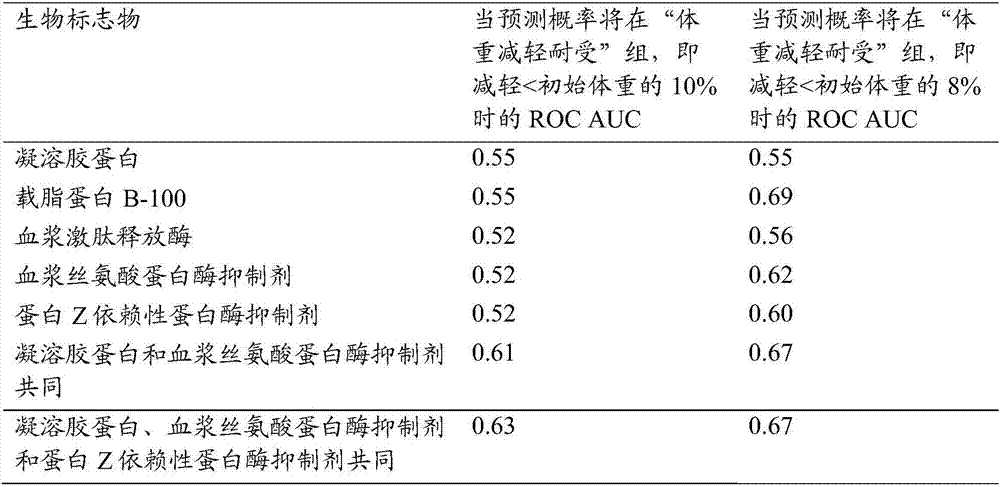Biomarkers for predicting degree of weight loss in female subjects
A technique for weight loss and subject application in biological testing, biomaterial analysis, biochemical equipment and methods, etc.
- Summary
- Abstract
- Description
- Claims
- Application Information
AI Technical Summary
Problems solved by technology
Method used
Image
Examples
Embodiment 1
[0179] Example 1 - Predicting weight loss in women following LCD using a combination of plasma biomarkers and anthropometric measurements
[0180] Subjects participated in the Diogenes study. This study is a pan-European, randomized and controlled dietary intervention study investigating the effect of dietary protein and glycemic index on weight loss and weight maintenance in obese and overweight households in eight European centers (Larsen et al., Obesity reviews (2009) , 11, 76-91).
[0181] Weight loss trajectories were investigated in a cohort of overweight / obese individuals participating in an eight-week LCD weight loss program (Larsen et al., 2010).
[0182] The study included 938 European individuals, of whom 782 completed the 8-week LCD program and 714 completed all required measurements in the range acceptable for live subjects. The general characteristics of the individuals are shown in Table 1.
[0183]
[0184] Table 1: General Characteristics of Individu...
Embodiment 2
[0192] Example 2: Stratifying Women According to Predicted Weight Loss and Success Thresholds
[0193] The term "weight loss tolerance" is understood as the predicted percent weight loss below a predetermined threshold. For example, "tolerance to weight loss" can be defined as a predicted decrease in bmi units less than the 30th or 15th percentile of the expected bmi decrease (where bmi decrease = (bmi1-bmi2)*100% / bmi1).
[0194] The term "weight loss sensitive" is understood as a predicted percent weight loss above a predetermined threshold. For example, "weight loss sensitive" can be defined as a predicted decrease in bmi units greater than the 70th percentile or 90th percentile of the expected bmi decrease.
[0195] The expected mean median or other percentile of bmi reduction can be obtained by the skilled artisan on a sample of subjects (from the population of interest) who have been subjected to a dietary intervention similar to the one to be used.
[0196] Receive...
PUM
 Login to View More
Login to View More Abstract
Description
Claims
Application Information
 Login to View More
Login to View More - R&D
- Intellectual Property
- Life Sciences
- Materials
- Tech Scout
- Unparalleled Data Quality
- Higher Quality Content
- 60% Fewer Hallucinations
Browse by: Latest US Patents, China's latest patents, Technical Efficacy Thesaurus, Application Domain, Technology Topic, Popular Technical Reports.
© 2025 PatSnap. All rights reserved.Legal|Privacy policy|Modern Slavery Act Transparency Statement|Sitemap|About US| Contact US: help@patsnap.com



